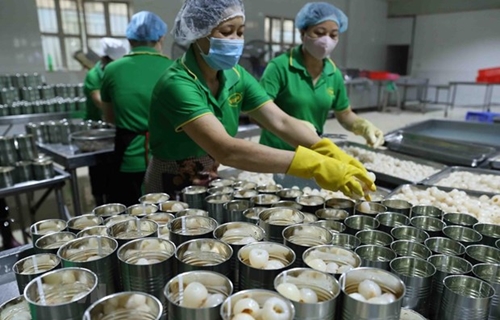Opening the workshop, Le Thanh Hoa, deputy director of the Agricultural Product Processing and Market Development Department at the Ministry of Agriculture and Rural Development (MARD), also introduced the Agreement on the Application of Sanitary and Phytosanitary (SPS) Measures.
He said bilateral and multilateral FTAs to which Vietnam is a party, including the EVFTA, all have regulations on SPS measures, including details on commitments set for Vietnamese farm produce exported to EU member countries.
    |
 |
|
Processed lychee are canned for export. |
Pham Dong Quang, former deputy director of MARD’s Cultivation Department, said the challenges for Vietnamese farming exports to the EU include regulations on origin, safety, animal and plant quarantine, and intellectual property protection, as well as issues related to fair trade and sustainable production.
Farming in Vietnam is of small scale and lacks links, he said, while producers remain unfamiliar with recording product origin information. These result in exports facing the risk of trade protection measures being applied by the EU.
He recommended local companies carefully read the agreement to boost production for better links in value chains, increase investment in processing, and apply international standards in business management.
The official also suggested they apply sustainable production standards following importers’ requests, develop organic farming, and improve human resources.
Experts have said Vietnam’s agricultural sector will be one of the biggest winners from the EVFTA, as a reduction in tariffs will increase demand and boost exports to Europe’s large, high-spending consumer market.
According to EU figures, trade in agricultural products represents 11.75 percent of the total two-way trade between Vietnam and the EU.
Source: VNA